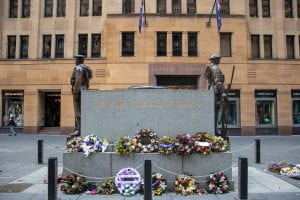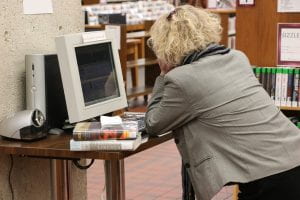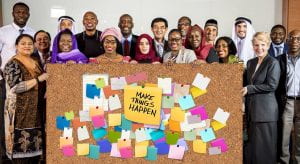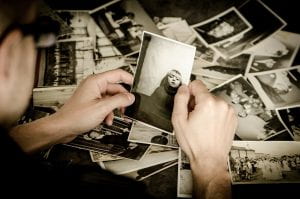So your family has been in the one area for many years or generations. Have you thought to check with the local family history society? They might have more information not found on the normal genealogical databases. They have access to the local papers and stories passed on by inhabitants of the area.
Our questions were:
- Have you joined a local society or one where your ancestors lived? What benefits do/did you gain from the membership?
- How has a society helped progress your research, family history education, provided access to off-line records or volunteering on special projects?
- With aging members and the advance of digital technology are Genealogy Societies irrelevant in today’s world? How do they make sure they are relevant?
- What can societies offer to attract members in the 21st century? What traditional offerings should they continue to provide?
Family history societies in the 21st century
- We ask on the new member application a big question about helping, skills, previous jobs, etc. with the idea that this data can be useful – Fran
- We run a competition in the primary school each year in memory of one of the members who also taught in the local school – Carmel
- We have just established a media committee yesterday to make our FB posts more relevant and regular and to integrate promotion across posts, website and the locally owned papers. Set up a digital calendar so all can contribute ideas – Carmel

- Would partnering with us at UTAS Family History be something that appealed to members of family history societies? What sorts of things could we partner on that would be useful/helpful/fun? – Kate
- The more we can bridge the gap between academic family historians & society family historians the better. Sharing/learning research skills. Access to/identification of academic history journals. I miss the UTAS family history discussion boards – Brooke
- Work with teachers and students in researching the local area, sports teams, interviewing the older members of the area and writing up what they found out. Add to Facebook or a blog/website or the FHS newsletter – Sue
- A retired person may be more willing to develop new skills rather than continue doing what they’ve done at work for decades. Also people’s personal obligations and health may limit their volunteering – Pauleen
- I am working with local society, local council and @SocAustGen to present a program through the local library. Win-win for all three parties – Jill
- I think the key to staying relevant is social media marketing. Even if the records are dusty, societies’ marketing should be flash. They have to let people know what they have, what they do. – Brooke
- Being transparent with decision making and allowing members to input on decisions is good. They do not have to input, however, the option should be available. – Fran
- Societies need to recognise that each speaker brings skills and knowledge to their presentations with a large time commitment that should be recognised financially eg a book voucher, perhaps a credit on membership or similar. – Pauleen
- Keep in contact with local school and do activities with them, might get some youngsters joining a few years later eg ANZAC day or history of the area – Sue

- Societies need to be where their (potential) members are and if that is on social media then so be it. What can we offer? An up to the minute #familyhistory news aggregation service of sorts amongst other things. – Alex
- Social media is great for providing that news aggregation service! We’ve also just tried our first digest of ‘News from the Twittersphere’ which has had great feedback including an appreciative email from someone who isn’t on Twitter! – Society for One Place Studies
- Upgrade services such as the society newsletter/magazine. Eg, New @SocAustGen mag has recently been revised so that its a magazine I want to keep & refer to now. It was a step-change in modernisation. – Brooke
- Offering other societies’ newsletters electronically makes it easier to build up a library for your areas of interest. More societies are offering e-newsletters. – Pauleen
- Run some basic one hour sessions during Family History month in your local library and have pamphlets with contact numbers etc and joining info. – Sue
- Encourage members to take advantage of library facilities not just online resources – Pauleen
- I think this year has made us realise that we can all do things differently, bringing presentations to people’s homes for example who are unable to physically attend a meeting is a good thing in my opinion – Paul
- Caloundra FHS welcomes new members in person and in the newsletter as well as running a buddy system – Pauleen

- I think societies also need to demonstrate what their resources and records can provide towards research beyond the Internet. Just promoting them by title isn’t enough. – Pauleen
- Societies could collaborate with other local interest groups on shared events invite non members – Hilary
- Good response about society inclusivity. This includes offering times when those who aren’t retired can attend events. – Paul
- Offer more society databases and indexes online via the society’s membership-access website. – Pauleen
- To remain relevant societies need to find ways to attract volunteers to run them, manage social media, give presentations, edit journals, organise events and other jobs – Sharn
- Ensuring the website has the right information to showcase what the society can do to help new members – Hilary
- If 2020 has taught us one thing it’s that there’s a demand, and place, for online learning. Attending society seminars world-wide, otherwise inaccessible, has been great. Societies can also bring in additional income with multi-speaker sessions – Pauleen
- If we have to compete with the comfort of the home lounge, what we offer away from home has to be pretty special and appealing. Maybe we can only do that by combining forces with other like-minded groups/organisations. – Alex
- I think online memberships, with online meetings and classes. Getting to and from anywhere takes up valuable time. Genealogy conferences seem to have worked quite well during lockdowns. Virtual research assistance, where you can consult via Zoom. – Seonaid

- Societies have to make sure that they are as inclusive as possible, age, sex, ethnicity, we need to encourage as much as we can, a diverse demograph so that everybody feels included not excluded – Paul
- I would like to see societies have a person to welcome people at all meetings. I’m sure some do this. If these cliques continue, younger people will never attend – Jennifer
- Societies need to offer more online availability to access records and webinars for people who cannot attend. Lots of traditional talks are always appreciated – Sharn
- Societies must continue to create and publish local indexes and stories but these need to made accessible outside society hours – Jill
- This is interesting in local group where locals have worked tirelessly to raise funds for resources and for a building, local govt. library system looking at RecollectCMS to bring resources of all local heritage groups together. I think it is a great idea! – Carmel
- Is it dangerous when the same people stay in leadership roles for too long? – ANZ
- The most successful societies have members who think ahead and ask the membership for their views – Hilary
- Societies need to make sure they remain relevant by at least putting indexes online. Meetings often not scheduled for times that workers are able to attend, workers also time poor. Online memberships, classes/speakers online. This has taken off during Covid. – Seonaid
- They need to advertise opening times etc and contact names and numbers especially if people are travelling and want to visit a FHS relating to their ancestors – Sue
- As long as societies continue to send out newsletters, list of publications and advertise upcoming events online or otherwise, people will remain interested. – Sharn
- Members expect something for their money but they don’t all want to give anything maybe FHS should have a contract for members – Hilary
- Societies need digital savvy members especially if they are adding their images and objects to museum type databases. Also if they are creating their own databases from local papers etc – Sue

- Some of our members run fantastic Facebook Pages / Groups for their #OnePlaceStudies and (in some cases) associated societies, which are great for engagement. Love the idea of producing a biennial book using the shared stories and photos!
- Societies will wither and die if they don’t move into the 20th century. They must embrace the Facebook generation with a social media presence and online resources and learning activities that can be accessed anywhere, anytime. – Jill
- We need to recognise that times change and people’s attitudes change and we need to be cognisant of that on many levels. The word Society/Group can imply exclusivity and I think we need to be more aware of this. – ANZ
- There exists in some #FamilyHistory societies an idea that resources bought with group funds should only be for members’ use. Let’s share our goodies! They may be the bait that attracts new members. – Jill
- Genealogy societies don’t always have to meet face-to-face – we’ve seen that this year more than any other. In fact, the necessity of virtual meetings has been of great benefit to members who have impaired mobility or live remotely. – Maggie
- Societies play an important social role in the community. They need to host casual events that encourage conversation and collaboration. – Jill
- Family History Societies need to move with the times to recruit younger members too many stuck in the past – Hilary
- Societies need to think about the audience they are trying to attract and what these people are looking for in a society. They need to review their members skills to see if they have members that can develop “products” can match these needs. – Fran
- During the Queensland sesquicentenary in 2009 many societies undertook volunteer activities seeking submissions from family members about their pioneers. Many of these databases and stories are underutilised by those who simply don’t know they exist. – Pauleen
- I think resources need to be shared but there is nothing wrong with Societies charging a research fee or having resources behind a members wall. More importantly they need to tell others what they have. Love online family history society catalogues – Shauna

Personal highs and lows in membership
- I wanted to join a local society. Was told I had to be sponsored by a member. I was new to town and knew nobody. The person at desk could not recommend a member to do it. I didn’t join. This is the kind of attitude that will cause societies to die out – Jennifer
- It’s why I’ve dropped membership of some societies – too hard to renew! Not being able to pay easily (and automatically) online. – Maggie
- I really don’t like Facebook groups. Sometimes the anonymity brings out the worst in people. – Brooke
- My first meeting no one spoke to me even though I had phoned to say I was coming. I didn’t go back until there was an open meeting. Gave up after a few months. – Margaret
- I belong to a couple long term plus some online forums … particularly focused on supporting ancestorian.com at the moment because it has lots of potential … members of all ages there – Jane
- A society where the general meeting is only held with committee members and no one else welcomed…or maybe that was my perception. Societies should not be closed clubs – Pauleen
- Our local society usually introduces visitors and new members at the beginning of the monthly meetings. Nice touch, I feel. – Maggie
- I volunteer Fridays at local library helping with family history and always mention the local FHS where there are more resources than can be found online – Sue
- The opportunity to mix with like-minded enthusiasts is a big advantage. Tech help and DNA and other Special Interest Groups societies can help expand a member’s confidence with technology and point them in the direction of appropriate research strategies. – Pauleen
- I’m from a regional area, and have been able to attend many virtual conferences and sessions this year. I’ve loved them – Jennifer
- When the Sorell group opened a Facebook group, suddenly numbers in the society went up dramatically but they don’t come to meetings, but communicate through the Facebook group. Sharing photos and stories that go into a biennial book. – Sue

- It is my humble opinion that #QFHS #ANZAncestryTime has gone above and beyond to support their members during this difficult time. Adapting to new technology quickly, communicating regularly with members and encouraging those less technologically savvy to take up the challenge. – Alex
- More Zoom meetings including special interest groups so I am doing more than if I had to travel places – Shauna
- Shoutout to #Hawkesbury #FamilyHistory Group in my ancestors’ area. A collaboration between the local library and FH group that makes resources available during long library opening hours – Jill
- During COVID able to keep volunteering with local society but not with local library. Opportunities to enhance the group’s collections online in members only website – Carmel
- Where do I begin? My home society #QFHS let me volunteer in the following areas: bookshop convenor, indexing, transcribing headstones, teaching, library asst, writing journal articles. So many ways. – Alex
- I love the journals that are published by family history societies. They can be very helpful for research. – Jennifer
- Our local one does a broad range of things. I like it that many of the talks are about things I would never think to go to and rarely find them uninteresting – Fran
- Shoutout to #LakeMacquarie Family History Group, My local Society. As a newbie to the area membership has given me an entree to the local community – Jill
How have FHS helped in your ancestor research or your research skills
Sharn: Specialist societies which have information about trades, particular locations and local history have been invaluable in my overseas family history research
Maggie P: Irish special interest group of NZSG- I have been helped in specific ways for my specific research needs. Putting Peggy instead of Margaret in a search turned up my grt-grandmother’s baptism.
Brooke: Not a family history society as such, but there is a historical group in a small town in Suffolk, called Haughley. They have been so helpful, including putting me in touch with cousins.
Willsman/Denman ONS: The local one so I could attend meetings, and several FHS from where my ancestors came from, including @TheSDFHS, @devonfhs, @GlamorganFHS. Local FHS are great – all that local knowledge
Marian: I joined a small #FamilyHistory society in the US state of Indiana and a kind member volunteered to photograph gravestones in the local cemetery. Helped me identify more cousins I couldn’t previously connect to that ancestral line! Very grateful.
Pauleen: Seminars, workshops and Special Interest Groups have offered me great learning opportunities over the decades via the expertise of knowledgeable presenters. However, you also have to do your own wide research and reading to expand your knowledge
Fran: From NZSG does help my research with all the records that they have indexed over time.
Seonaid: Through membership of the NZ Society of Genealogists (NZSG) I’ve been to many awesome genealogy events. Fab speakers. Its really helped with my professional and personal development. I’ve made lots of friends and many professional contacts.
Jane: I am a member of the Guild of ONS as well … don’t have one but have contributed info to some
Sharn: Being a member of a family history society has provided greater access to their records. And the sharing of information between members has increased my own knowledge.
Carmel: SA genealogy has all the BDMs as well as several other databases for members, transcriptions quite cheap for members
Sue: Have found family files at local FHS which you can copy or scan with your camera or ipad
Maggie: Most of the societies I have joined offer either offline research help, useful genealogy publications, virtual and onsite presentations, or a mix of these. Local knowledge is king!
Sharn: At Rootstech this year I joined the Hampshire FH Society because I am researching a house and the part it played in WW2. A member’s grandfather had memories of the secret runway AMAZING
Paul: I have benefited greatly over the years from the many different societies that I have joined, you can’t beat that in depth local knowledge. People have kindly carried out look ups, taken photos of graves, houses etc, so kind and helpful
Sharn: I have found an English society called The Mills Archive Trust invaluable in my research into my ancestors who were millers in Lincolnshire. I would not have understood milling and mills had it not been for this society
Sharn: I am a member of the One Place Society and the Surname Society. It’s amazing what you can learn from others’ research
Alex: My favourite is Yass and District Historical society – great for my convict ancestors
Hilary: Membership of the Guild of One Name Studies has been most beneficial for me
Sue: I am a member of the Sorell Historical Society because I taught at the school there for 20 years and would often use their resources when teaching local history. Their facebook group is great
Pauleen: Just recently I was contacted by a cousin whose branch I’d failed to track down – all because the local society knew me and referred her to me. Very happy with that!
Jennifer: I joined Bedfordshire FHS many years ago. A member went to the archives and copied documents then sent them to me. We are still in touch., That was really great
Interesting links
Join us on Sunday to hear from Orkney Family History Society and Borders Family History Society. We start at 6 pm EDT live from #Scotland The full schedule will be added to scottishindexes.com soon.
Coming up on @SocAustGen in January yours truly on the AJCP via @TroveAustralia – Carmel
Cooray-Noosa website – up-to-date and looks 21st century
My Ancestors website with links to lots of Family History groups
Ancestorian website with links to posts from members of different FHS around UK mainly but starting to include Australian and New Zealand links – Family history social network
National Library Australia has links to FHS groups
Found this list of Facebook groups and other genealogy groups a few years ago, but they are updated. You’ll notice Alona has an Aussie list
Think I might need to join Society of Australian Genealogists for their seminars etc.
New Zealand Society of Genealogists has a great looking website
Lots of information on the front page of the Queensland Family History website
South Australia Genealogy also includes shopping cart
Cora Web has lists of Aussie FHS
Cyndi’s List has many groups mentioned especially for USA
Family History Federation for those groups in the UK
Post by Paul about joining a FHS
Great quotes
We need to remember that genealogy groups are for everyone – they are not senior citizens clubs – Jill
I hope that the personal, face-2-face factor and a welcoming environment make the difference. Online databases are all very well but you need the personal element. Societies need to make sure they are non-threatening & inclusive. – Alex
Readers: Are you a member of a family history society? What are the benefits of being a member? How do they help with your family history research?